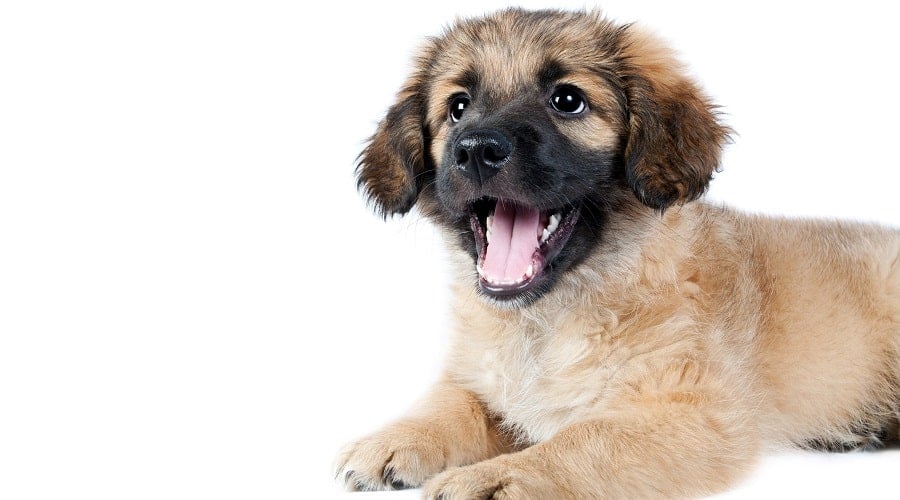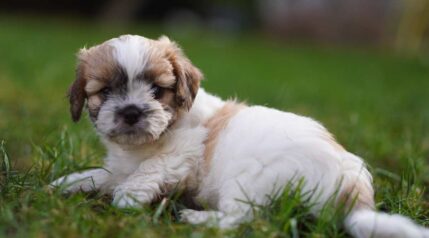The Miniature German Shepherd is sometimes known as the Mini Shepherd. They are a new doggy mix and are becoming increasingly popular with dog lovers worldwide. For those who love German Shepherds but want or need a smaller version, the Mini Shepherd might answer their doggy dreams.
Instead of being a small-size standard German Shepherd, it is, in fact, a German Shepherd mixed breed. There is no such thing as a purebred Miniature German Shepherd. They are a cross between a purebred German Shepherd and a smaller dog, commonly a Collie or a miniature Poodle. Some breeders might mix a purebred German Shepherd with a Yorkshire Terrier, although this is extremely rare.
In this Miniature German Shepherd breed guide, we examine everything you need to know about them. From a list of commonly used parent breeds to their typical personality, exercise needs, training requirements, puppy prices, and more. So, without further ado, let’s jump into the world of the Mini German Shepherd.
History
The Miniature German Shepherd is one of the newest designer doggos to join the market. It’s unclear when they were first created, but they are likely to have appeared during the late 20th or early 21st century. To understand the Miniature German Shepherd better, it’s essential to examine the German Shepherd’s history briefly.
German Shepherd

The German Shepherd is one of America’s most popular dog breeds. According to the American Kennel Club (AKC), they consistently rank in the top five dog breeds. They are a herder from Germany, and until the 19th century, they varied from district to district. That was until a German cavalry officer solidified the breed we know and love today.
German Shepherds are large dogs weighing 50 to 90 pounds and standing 22 to 26 inches tall, from paw to shoulder. They have a double coat in many colors, but black and tan is the most iconic Shepherd color. The German Shepherd breed standard states that a medium-length coat is the most desirable, although they also come in short and long-hair varieties.
Commonly Used Parent Breeds

The Miniature German Shepherd has one purebred German Shepherd parent, but the other breed isn’t a set. When working with a breeder, you must know what the other parent is, which influences the dog’s personality and appearance. This list isn’t exhaustive, but lists the most commonly used breeds in this mix.
- Miniature Poodle – This mix breed also goes by the name Shepadoodle.
- Collie – A German Shepherd and Collie mix is sometimes called a Shollie.
- Siberian Husky – These pups might also be called Siberian Shepherds.
- Golden Retriever – The Golden Shepherd is a mix of the Golden Retriever and the German Shepherd.
- Corgi – This is a rarely used breed to make the Mini German Shepherd, but these mixes are called Corman Shepherds.
- Yorkshire Terrier – This is a scarce mix breed due to the size difference, but it creates one of the smallest German Shepherd mixes.
If you’re looking to welcome a Mini German Shep into your home, it’s essential to research the other breed because your new pup will inherit a mix of characteristics from them both. Although a Shepadoodle and a Corman Shepherd can be called a Miniature German Shepherd, they can differ greatly. You need to know for sure what the other parent is and know that they match you and your lifestyle.
Temperament

A typical Miniature German Shepherd puppy is confident and courageous. They inherit a protective streak from the German parent, which means you can expect a mini guard dog to watch over your family and home. But remember that the other parent might not have any protective characteristics, so they might not be as protective as a purebred German Shepherd.
Mini German Shepherds are loyal and people-oriented, so they form close bonds with their families. Most Minis snuggle up to every member of their family regardless of who is the primary caregiver. But they might develop an extremely tight bond with their favorite human if they take after the German Shepherd more. Many Minis hate to be left alone and often suffer from separation anxiety. So you need to spend most of your day with them.
The influence of the other parent breed means they are more likely to be friendly and sociable with strangers than purebred German Sheps. Although they might be slightly shy at first, soon after meeting a new person, they tend to greet them with affection. This is an excellent trait for social families looking for a less hostile or aloof version of the German Shepherd.
All German Shepherd mixes have high energy levels, and you can expect this from a Mini German Shepherd. They might be slightly less active than a purebred German, depending on what they are mixed with. But on the other hand, they could be even more active if they are a Husky or a Collie mix. Either way, you can expect a fun and happy companion who wants to play with their family all day.
Size & Appearance

The Miniature German Shepherd could be an excellent choice if you love German Shepherds but need a much smaller version due to the lack of space or young kiddos. A Mini German Shepherd usually weighs between 30 and 50 pounds and stands 15 to 20 inches tall. But they can be smaller than this, depending on the parent’s breed and size. It’s difficult to tell how small or big they will become as an adult, so you must find out what the other parent is.
You also need to ensure that the Miniature German Shepherd isn’t just a German Shepherd suffering from dwarfism. Irresponsible breeders might advertise them as a Mini Shep, but instead, you’re buying a growth-stunted pup due to a genetic abnormality. Dwarfism can also lead to secondary health problems, so you must ensure you are purchasing a genuine Mini Shep.
Like most other mixed breeds, there is no set standard outlining what they should look like. They might inherit the face and head of the German and the body or shape of the other parent. Or they could be an equal blend of both. Overall, they are usually medium-sized in comparison to the large German Shepherd.
Coat & Colors
Most Mini German Shepherds have a thick, dense double coat with straight hair. However, if their other parent has curly hair, like the Poodle, they could inherit a slightly wavy texture. Many Mini German Sheps inherit the standard colors of the German Shepherd, sometimes almost identical. They might inherit the wide range of colors found in the Poodle mix, or you might find a Mini with a blend of wolf-like colors and markings similar to the Husky. The possibilities in a Mini German Shep coat are extraordinary.
If you’re looking for a German Shepherd mix better for allergy sufferers, a pup with a Poodle parent is the best option out of all the breeds. However, you can’t guarantee they are hypoallergenic like their Poodle parent. Any breeder suggesting that a Mini German Shep is hypoallergenic is deceiving you. So, if you need an allergy-friendly pup, you might be better off adopting a purebred Poodle.
Exercise & Living Conditions
No matter what their other parent breed is, you can expect that all Miniature German Shepherd dogs have medium to high energy. So, if you’re looking for a lazy lapdog, this is not the mixed breed for you. They need around 60 minutes of daily exercise to keep them happy and healthy, slightly less if they are a small Mini German Shep. They need a wide range of challenging dog toys to keep them entertained throughout the day and plenty of interactive playtime.
Mini Sheps become destructive, unruly, and unhappy if you don’t stimulate their minds enough. This could exhibit itself in destructive behaviors, nipping, or howling. And remember that they become lonely quickly and hate to be left alone. So they need a family that can work from home or spend most of their day playing with them. You might consider hiring a dog walker if you have to leave them for more than a few hours.
One of the benefits of a Miniature German Shepherd is their compact size compared to their large parent, which means they are suitable for apartment living. They would love a yard to romp around, which must be secure to prevent them from escaping. But they could be just as happy without one as long as they are exercised daily. As a people-oriented canine, they can live with dog-savvy children and other pets as long as they are socialized well.
Training

Most German Shepherd mixes inherit their smarts and people-pleasing qualities, making them obedient pup. You have to be consistent with your training. Otherwise, they might forget their manners, but they can be great dogs for first-time owners. You could also seek training assistance from someone like Doggy Dan.
Socializing your Mini German Shep is critical if you want them to grow into a well-balanced dog. They can become overprotective if you don’t mix a protective dog breed with other humans and dogs. Expose them to as many new experiences as you can so they can build their confidence as they develop into an adult. A responsible breeder socializes their puppies from day one, and it’s your job to continue this.
Crate training a Mini German Shep is a great idea. It gives your pup a safe space to relax when they need time out. Knowing they are safe when you aren’t there also gives you peace of mind. Find a crate that can grow with your Miniature German Shepherd, and pick a tough crate to keep these equally tough pups safe. Give them time to feel comfortable using it, and never use the crate as a punishment.
Health
Miniature German Shepherds are relatively healthy and tend to be healthier than their purebred GSD parent, thanks to the genetic influence of other breeds. The best way to keep your dog healthy is to stay up-to-date with health checks and vaccinations. And feed them high-quality nutrition and exercise them daily. Consider investing in pet insurance for your dog to help offset the high vet bills associated with emergency or unexpected healthcare needs.
The Miniature German Shepherd is predisposed to whatever conditions their parent is predisposed to. So, the health concerns to look out for are entirely dependent on what parent they have. This is why it is essential to research their other parent’s health problems. The following conditions are hereditary in the German Shepherd breed, so it’s important to be aware of them.
Hip Dysplasia
The German Shepherd has one of the highest rates of hip dysplasia in the canine kingdom. So this is something to look out for. Hip dysplasia occurs when the hip joint forms abnormally and causes mobility problems. If you notice your pup is struggling with movement in their rear legs, take them to the vet for an examination. Working with a breeder who only breeds German Shepherds with good hip scores is also imperative. So be sure to ask for a certificate proving this.
Degenerative Myelopathy
Degenerative myelopathy is similar to multiple sclerosis in people, and it causes slow-onset paralysis in the dog’s hind limbs. Symptoms usually appear from four years of age. Although it is incurable, it is manageable with medication. Sadly, affected dogs lose mobility altogether, and the only option is euthanasia. Responsible breeders never breed dogs with this condition.
Nutrition

How much you feed your Miniature German Shepherd depends on their size, age, activity levels, sex, the type of food you choose, and other factors. But you should always feed them according to the instructions on the packet. It should also be a high-quality diet that has the approval of the Association of American Feed Control Officials (AAFCO).
Feeding your Mini German Shep a breed and age-appropriate diet is crucial, especially during the puppy period when their body is developing. Puppy food helps control the pace at which their joints grow, which contributes to preventing joint dysplasia. Likewise, be sure not to overfeed your pooch as the additional weight stresses their cardiac system and joints, decreasing their overall health. Why not consider a customizable fresh subscription option like Ollie?
Grooming
Grooming your Miniature German Shepherd shouldn’t be overly demanding, considering they are relatively small and have a standard double coat like other breeds. They need bathing once every two to three months, maybe slightly more if they get super muddy on their adventures. Keep their nails short to prevent sores, and begin their weekly dental regime from a young age to keep their teeth and gums healthy.
Again, how often you brush them depends on what type of coat they inherit. Most Mini German Sheps need brushing weekly to keep their coat healthy and tangle-free throughout the year. They are likely to shed heavier during the shedding seasons and need a deshedding tool to remove the dead hair. If they are a Poodle mix, they might need more attention to prevent their curls from matting and Poodle-specific brushes for grooming.
Breeders & Puppy Costs
Working with a responsible breeder who allows you to meet with the puppies and parents and provide you with relevant health certificates is imperative. It’s crucial to know what breeds their parents are so you know that the puppy you’re buying is what you want. Knowing this information can help you meet their needs better, too. You should avoid any breeder who is cagey about their puppies or cannot answer questions. So, make yourself aware of the tactics irresponsible breeders use. Research is crucial to finding the right breeder.
How much a Miniature German Shepherd puppy costs depends on many factors, including the other parent’s breed, location, time of the year, reputation, and demand. Generally, you can expect to pay around $1,000 for a Mini German Shepherd from a responsible breeder. You also need to budget for other costs associated with buying a puppy, such as supplies, beds for German Shepherds, and additional costs.
Rescues & Shelters

Rescuing a Miniature German Shepherd is possible, although they are becoming increasingly popular. So don’t expect them to hang around for long. If you already have a Mini Shepherd and want to know more about their mixed heritage, a DNA test kit can help. The costs of adopting a dog are usually much lower than buying a puppy from a breeder.
Visit your local shelters and speak to the staff who can help you in your search for a Mini German Shepherd. They might know about incoming dogs or others in nearby shelters if they don’t have one during your visit. Alternatively, visit online rescue organizations. They often list dogs needing homes nationwide and can increase your chances of finding one.
As A Family Pet
- Miniature German Shepherds weigh between 30 and 50 pounds.
- They are ideal for apartment living.
- With proper training and socialization, most make great family pets.
- They have relatively high energy and need daily exercise.
- Mini Sheps are super fun and joyful.
- Stimulate their minds with toys and play.
- They usually have a protective streak.
- Mini Sheps are friendly with most new people.
- Their grooming regime is often simple.
- Miniature German Shepherds vary in size and personality depending on their parents.
Final Thoughts
The Miniature German Shepherd is not a purebred dog but a German Shepherd mixed breed. They can be any smaller breed, although they are commonly Collies or miniature Poodles. The key to finding a healthy dog and giving them what they need is to work with a responsible breeder who can tell you about their heritage. No matter what other breed they are, Mini German Shepherds are adorable and make fantastic family companions.





